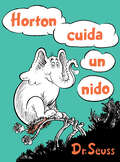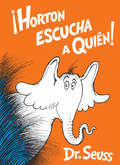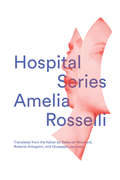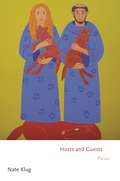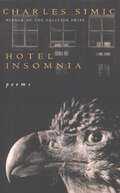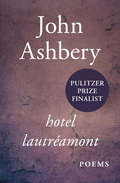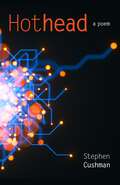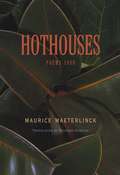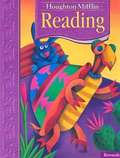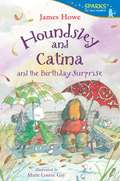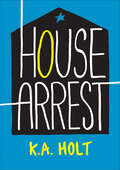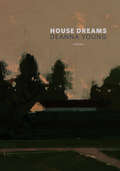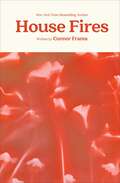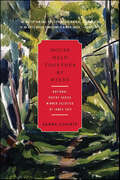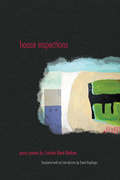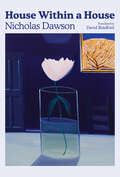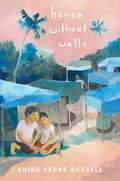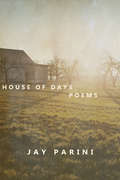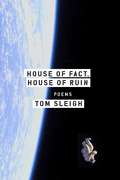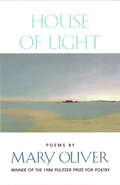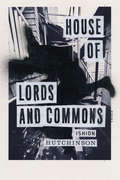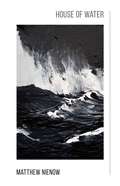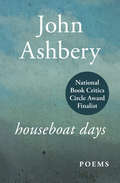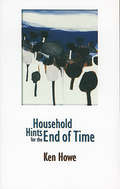- Table View
- List View
Horton cuida un nido (Classic Seuss)
by Dr. Seuss¡Edición en español y rimada del clásico de Dr. Seuss en el que se nos presenta por primera vez a Horton el elefante! Querido durante generaciones por su bondad y lealtad, Horton el elefante es uno de los personajes más icónicos y respetados de la literatura infantil. En este libro, en el que Horton pronuncia las palabras «Va en serio lo que dije, y lo que dije así lo siento… Un elefante es leal, ¡y es leal al cien por ciento!», vemos recompensada su integridad con una sorpresa final que encantará a los lectores de todas las edades. Las ediciones rimadas en español de los clásicos de Dr. Seuss, publicadas por Random House, brindan la maravillosa oportunidad de disfrutar de sus historias a más de treinta y ocho millones de personas hispanohablantes en Estados Unidos. Los lectores podrán divertirse con las ediciones en español de The Cat in the Hat (El Gato Ensombrerado); Green Eggs and Ham (Huevos verdes con jamón); One Fish, Two Fish, Red Fish, Blue Fish (Un pez, dos peces, pez rojo, pez azul); The Lorax (El Lórax); Oh, the Places You'll Go! (¡Oh, cuán lejos llegarás!); How the Grinch Stole Christmas! (¡Cómo el Grinch robó la Navidad!); The Cat in the Hat Comes Back (El Gato Ensombrerado ha regresado); I Can Read Wwth My Eyes Shut! (¡Yo puedo leer con los ojos cerrados!); Horton Hears a Who! (¡Horton escucha a Quién!); The 500 Hats of Bartholomew Cubbins (Los 500 sombreros de Bartolomé Cubbins); There's a Wocket in My Pocket! (¡Hay un Molillo en mi Bolsillo!); Mr. Brown Can Moo! Can You? (¡El Sr. Brown hace Muuu! ¿Podrías hacerlo tú?); Ten Apples Up on Top! (¡Diez manzanas en la cabeza!); What Pet Should I Get? (¿Cómo podré decidir qué mascota elegir?); Yertle the Turtle and Other Stories (Yoruga la Tortuga y otros cuentos); Oh, the Thinks You Can Think! (¡Oh, piensa en todo lo que puedes pensar!); The Foot Book! (¡Cuántos, cuántos pies!); Happy Birthday to You! (¡Feliz cumpleaños!); Come Over to My House (Ven a mi casa); Dr. Seuss's Sleep Book (¡Dormilones!); Would You Rather Be a Bullfrog? (¿Preferirías ser una rana?); Horton Hatches the Egg (Horton cuida un nido); y Dr. Seuss's 1 2 3 (Cuenta con Dr. Seuss 1 2 3). A rhymed, Spanish edition of the Dr. Seuss classic that first introduced Horton the Elephant! Beloved by generations for his kindness and loyalty, Horton the Elephant is one of the most iconic and honorable characters in children's literature. In this book—the comic classic in which Horton utters the line "I meant what I said, and I said what I meant. . . . An elephant's faithful, one hundred per cent!"—we see his integrity rewarded with a surprise ending that will delight readers of all ages.
Horton escucha a Quién! (Classic Seuss)
by Dr. Seuss¡Edición en español y rimada del clásico de Dr. Seuss acerca de la bondad! Horton el elefante, uno de los personajes más heroicos de la literatura infantil, nos enseña en esta intemporal, conmovedora y cómica historia que «una persona es una persona, por muy pequeña que sea». Contada con el estilo de Dr. Seuss, y con sus característicos dibujos, esta edición en español será del agrado de lectores y oyentes por igual.Las ediciones rimadas, en español, de los clásicos de Dr. Seuss, publicadas por Random House, brindan la maravillosa oportunidad de disfrutar de sus historias a más de treinta y ocho millones de personas hispanohablantes en Estados Unidos. A rhymed Spanish translation of Dr. Seuss's classic picture book about kindness!Horton the elephant—one of the most heroic characters in children's literature—shows us that "a person's a person, no matter how small" in this timeless, moving, and comic classic. Told with Dr. Seuss's signature rhymes and trademark illustrations, this Spanish edition of the beloved tale that will be enjoyed over and over, by reader and listener alike.Random House's rhymed, Spanish-language editions of classic Dr. Seuss books make the joyful experience of reading Dr. Seuss books available for the more than 38 million people in the United States who speak Spanish.
Hospital Series
by Giuseppe Leporace Amelia Rosselli Deborah Woodard Roberta AntogniniA poem cycle about hospital life and illness by revered, twentieth-century Italian avant-gardist. Hospital Series, a bruisingly intimate colloquy with an elusive lover, is Italian poet Amelia Rosselli's virtuoso, subversive, neo-Petrarchan sequence of poems. Rosselli wrote much of the series in the mid 1960s after being hospitalized for a mental illness she suffered from for most of her life, and whose pain shapes her language and difficult vision. These explosive poems, a furious cacophonic crescendo of semantic and syntactic accumulations deeply admired by Pier Paolo Pasolini, place Rosselli among the greatest writers of her generation.
Hosts and Guests: Poems (Princeton Series of Contemporary Poets #152)
by Nate KlugAn exciting new collection from a poet whose debut was praised by Colorado Review as “a seduction by way of small astonishments”Nate Klug has been hailed by the Threepenny Review as a poet who is “an original in Eliot’s sense of the word.” In Hosts and Guests, his exciting second collection, Klug revels in slippery roles and shifting environments. The poems move from a San Francisco tech bar and a band of Pokémon Go players to the Shakers and St. Augustine, as they explore the push-pull between community and solitude, and past and present. Hosts and Guests gathers an impressive range: critiques of the “immiserated quiet” of modern life, love poems and poems of new fatherhood, and studies of a restless, nimble faith. At a time when the meanings of hospitality and estrangement have assumed a new urgency, Klug takes up these themes in chiseled, musical lines that blend close observation of the natural world, social commentary, and spiritual questioning. As Booklist has observed of his work, “The visual is rendered sonically, so perfectly one wants to involve the rest of the senses, to speak the lines, to taste the syllables.”
Hotel Insomnia: Poems
by Charles SimicIn this volume, Simic fills the wee hours of his poetry with angels and pigs, riddles and cemeteries. His is a rich, haunted world of East European memory and american present-a world of his own creation, one always full of luminous surprise. “Simic writes so simply that his words fall like drops of water, but they ripple outward to evoke an ominous and numinous world” (Washington Post Book World).
Hotel Lautréamont: Poems
by John AshberyIn John Ashbery&’s haunting 1992 collection, just as in the traveler&’s experience of a hotel, we recognize everything, and yet nothing is familiar—not even ourselvesHotel Lautréamont invites readers to reimagine a book of poems as a collection of hotel rooms: each one empty until we enter it, and yet in truth abundantly furnished with associations, necessities, and echoes of both the known and the alien. The collection&’s title poem is itself an evocative echo: Comte de Lautréamont was the pseudonym taken by Isidore-Lucien Ducasse, a radical nineteenth-century French writer about whom little is known except that he produced one remarkable presymbolist epic prose poem called The Songs of Maldoror and died of fever at the age of twenty-four in a hotel in Paris during Napoleon III&’s siege of the city in 1870. Addressed to lonely ghosts, lingering guests, and others, the poems in Hotel Lautréamont present a study of exile, loss, meaning, and the artistic constructions we create to house them.
Hothead: A Poem
by Stephen CushmanHothead is a haibun-patterned, book-length declamation in which no topic is off limits—Buddha, Jesus, Lincoln, America, global warming, eros, mental illness, the natural world, technology, the aging body. Cushman’s poetry shows us how to live in a world in which it is difficult to balance “the place where light and dark meet.” With an outmoded laptop named Patience as his daily consort, the speaker navigates through themes of love, politics, and belief. “There’s got to be someone,” Cushman writes, “exploring the way,” and the speaker of Hothead steps in to fill those shoes with intelligence, endurance, moxie, and humility.
Hothouses: Poems, 1889 (Facing Pages #2)
by Maurice MaeterlinckOn May 31, 1889, a young Belgian lawyer from a wealthy bourgeois family in Ghent published a book of 33 poems in 155 copies. Maurice Maeterlinck's legal career was floundering but his road to literary greatness had begun. Long overshadowed by the plays that later won him the Nobel Prize, Serres chaudes (Hothouses) nonetheless came to be widely regarded as one of the cornerstones of literary Modernism after Baudelaire. While Max Nordau soon seized upon Maeterlinck's--tumult of images--as symptomatic of a pervasive social malaise, decades later Antonin Artaud pronounced, "Maeterlinck was the first to introduce the multiple riches of the subconscious into literature." Richard Howard's translation of this quietly radical work is the first to be published in nearly a century, and the first to accurately convey Maeterlinck's elusive visionary force. The poems, some of them in free verse (new to Belgium at the time), combine the decadent symbolism and the language of dislocation that Maeterlinck later perfected in his dramas. Hothouses reflects the influence not only of French poets including Verlaine and Rimbaud, but also of Whitman. As for the title, the author said it was "a natural choice, Ghent . . . abounding in greenhouses." The poems, whose English translations appear opposite the French originals, are accompanied by reproductions of seven woodcuts by Georges Minne that appeared in the original volume, and by an early prose text by Maeterlinck imaginatively describing a painting by the sixteenth-century Flemish artist Pieter Brueghel. A feat of daring power extraordinarily immediate and inventive, Hothouses will appeal to all lovers of poetry, and in particular to those interested in Modernism. Maeterlinck's enormous fame may have faded, but twentieth-century writers such as Beckett are still our masters who testify to its undying influence.
Houghton Mifflin Reading Rewards Level 3.1
by Houghton MifflinThe book contains: Theme 1: Off to Adventure!- Focus on Poetry; Theme 2: Celebrating Traditions-Focus on Trickster Tales; and Theme 3: Incredible Stories.
Houndsley and Catina and the Birthday Surprise (Fountas & Pinnell LLI Blue #Level K)
by James Howe Marie-Louise GayHoundsley is sad. Not because it is raining or because there are holes in his sweater, but because he doesn't know when his birthday is. All of a sudden Catina is sad, too. But friends are very good at cheering each other up, and Houndsley and Catina are the very best of friends. So it won't be long before they each discover, in a most surprising way, how a first-rate friend can brighten even the saddest days.
House Arrest
by K. A. HoltTimothy is on probation. It's a strange word--something that happens to other kids, to delinquents, not to kids like him. And yet, he is under house arrest for the next year. He must check in weekly with a probation officer and a therapist, and keep a journal for an entire year. And mostly, he has to stay out of trouble. But when he must take drastic measures to help his struggling family, staying out of trouble proves more difficult than Timothy ever thought it would be. By turns touching and funny, and always original, House Arrest is a middlegrade novel in verse about one boy's path to redemption as he navigates life with a sick brother, a grieving mother, and one tough probation officer.
House Dreams
by Deanna YoungHouse Dreams, Deanna Young's haunted and haunting third collection, is at once a core sample of the life we all live underground, and a view beneath the foundations of the various eras and places that make up one woman's life story. These poems have the plainspoken power, surreal shifting, uncanny logic and transformed everyday imagery of our most numinous dreams. It's as if Jung's assertion that "[w]hen an inner situation is not made conscious, it appears outside as fate," is taken up here as a reading guide back through time.
House Fires
by Connor FrantaThe New York Times bestselling author of A Work in Progress and Note to Self moves fully into adulthood with his illuminating, soulful, bleeding collection of narrative, poetry, and original film photography.Humanitarian, entrepreneur, and content creator Connor Franta first captivated readers with A Work In Progress, ruminating on his Midwestern roots to his early start as a visionary and online thought-leader. He continued his soul-searching-through-a-broken-heart with Note to Self, challenging readers—and himself—to ponder the spectrum of humanity and their place within it. Now as Franta approaches thirty, life is no less confusing, but he finds this journey endlessly fascinating. Writing about confusion and clarity, loneliness and whirlwind romances, despair and elation—and everything in between—Franta invites readers back into the intimacy of his mind. House Fires magnifies a young man&’s emotional warfare with his past, the daze of wandering through modern times in search of purpose, and the electricity flying from tomorrow&’s potential.
House Held Together by Winds (National Poetry Series)
by Sabra Loomis"These are my songlines; they helped me to re-connect with the landscape, and with my own life," says Sabra Loomis of the poems which appear in House Held Together by Winds. Winner of the 2007 National Poetry Series Open Competition as selected by James Tate (winner of the Pulitzer Prize and National Book Award), Sabra's work perpetuates NPS's tradition of promoting exceptional poetry from lesser known poets.For over twenty years, the National Poetry Series has discovered many new and emerging voices and has been instrumental in launching the careers of poets and writers such as Billy Collins, Mark Doty, Denis Johnson, Cole Swensen, Thylias Moss, Mark Levine, and Dionisio Martinez.
House Inspections
by David Keplinger Carsten René Nielsen"These poems do much more than blur the line between illusion and reality: they evoke that vibrant contradiction of dreaming in which the real and unreal exist in perfect simultaneity."--The Georgia Review Theatre A man performs whole days from his life as a drama, each day at home in his apartment. He goes to great lengths to be as realistic as possible, walking around the apartment and tending to day-to-day business. Only at night, when he sits by himself in the kitchen, does he peek now and then at the window to glimpse his audience. He won't completely abandon the notion that someone is out there. It's like when you stand on the landing, in front of a closed door, and you can't help thinking that someone is watching through the peephole. With a dozen poems previously published in The Paris Review, Carsten René Nielsen is already a familiar name to US poetry readers. These dark prose poems--reminiscent of Charles Simic--map out a uniquely European territory with chilling, cinematic clarity. Award-winning Danish poet Carsten René Nielsen is the author of nine books of poetry, including his US debut The World Cut Out with Crooked Scissors (2007). His poems appear in The Paris Review, Agni, Circumference, Mid-American Review, Mississippi Review, and elsewhere. He lives in Aarhus, Denmark. David Keplinger's poetry awards include the Colorado Book Award, T.S. Eliot Prize, an NEA fellowship, and grants from the Danish Arts Council. He directs the MFA program at American University in Washington, DC.
House Inspections (Lannan Translations Selection Series)
by Carsten René Nielsen"These poems do much more than blur the line between illusion and reality: they evoke that vibrant contradiction of dreaming in which the real and unreal exist in perfect simultaneity."—The Georgia Review Theatre A man performs whole days from his life as a drama, each day at home in his apartment. He goes to great lengths to be as realistic as possible, walking around the apartment and tending to day-to-day business. Only at night, when he sits by himself in the kitchen, does he peek now and then at the window to glimpse his audience. He won't completely abandon the notion that someone is out there. It's like when you stand on the landing, in front of a closed door, and you can't help thinking that someone is watching through the peephole. With a dozen poems previously published in The Paris Review, Carsten René Nielsen is already a familiar name to US poetry readers. These dark prose poems—reminiscent of Charles Simic—map out a uniquely European territory with chilling, cinematic clarity. Award-winning Danish poet Carsten René Nielsen is the author of nine books of poetry, including his US debut The World Cut Out with Crooked Scissors (2007). His poems appear in The Paris Review, Agni, Circumference, Mid-American Review, Mississippi Review, and elsewhere. He lives in Aarhus, Denmark. David Keplinger's poetry awards include the Colorado Book Award, T.S. Eliot Prize, an NEA fellowship, and grants from the Danish Arts Council. He directs the MFA program at American University in Washington, DC.
House Within a House
by Nicholas DawsonA meditation on the wiles of depression, illuminated by queer and diasporic experience. "We, nosotros, nosotras: somos sobrevivientes." Weaving prose poetry, essay, autobiography and photography in mutual contamination, Nicholas Dawson relates his own deep depression, a state never fully gone, always cohabitant. Amidst this persistence, "the body and the pen bring a plural syntax of alternative knowledges into being, one which allows us to know the world better, to know ourselves better, to better love daybreak and this sun obstinately piercing the curtain with its brazen rays." House Within a House, in a luminous translation by David Bradford, tells the story of what walls the depressed person in, what keeps them wandering inside, and what finally gets them, somehow, out of the house. The original book, Désormais, ma demeure, received the 2021 Grand Prix du livre de Montréal.
House Without Walls
by RussellFor most people, home is a place with four walls. It's a place to eat, sleep, rest, and live. For a refugee, the concept of home is ever-changing, ever-moving, ever-wavering. And often, it doesn't have any walls at all.Eleven-year-old Lam escapes from Vietnam with Dee Dee during the Vietnamese Boat People Exodus in 1979, when people from Vietnam, Laos, and Cambodia fled their homelands for safety. For a refugee, the trip is a long and perilous one, filled with dangerous encounters with pirates and greedy sailors, a lack of food and water, and even the stench of a dead body onboard. When they finally arrive at a refugee camp, Lam befriends Dao, a girl her age who becomes like a sister-a welcome glimmer of happiness after a terrifying journey. Readers will feel as close to Lam as the jade pendant she wears around her neck, sticking by her side throughout her journey as she experiences fear, crushing loss, boredom, and some small moments of joy along the way. Written in verse, this is a heartfelt story that is sure to build empathy and compassion for refugees around the world escaping oppression.
House of Days
by Jay PariniIn House of Days, his fourth collection of poems, Jay Parini moves beyond his earlier work to address the environmental and spiritual crises that afflict us in the late twentieth century. The book moves from "Nature Revisited," an elegiac sequence of poems about the ontological status of nature itself, to the title sequence, "House of Days," which might be thought of as the poet's field notes as he moves through a season, month by month. "The Ruined House," Part III, is an autobiographical sequence that revisits scenes from Anthracite Country (1982), Parini's acclaimed second volume of verse. From there, Parini moves through a series of spiritual explorations in "Another Kingdom." And in a highly inventive final sequence, "Reading Emerson in My Forty-Seventh Summer," Parini meditates on many of the great themes of Emerson--the quintessential American visionary--often blending his own language with quotations from Emerson. In all, House of Days represents a major development in the richly varied career of this hugely accomplished poet, novelist, and biographer.
House of Fact, House of Ruin: Poems
by Tom SleighTom Sleigh’s brilliant new collection is “full of the wonder and eloquence driving profound poetry” (Los Angeles Times)You’ve got to put your pants on in the house of fact.And in the house of fact, when you take off your shirt,you can hear your shirt cry out, Facts are the floor, factsare how you make the right side talk to the left.I’m washing my naked belly clean, and doing it with dignity.I’m turning around, trying to see the filthinessthat keeps making me filthy.—from “House of Fact, House of Ruin”“I hate to admit it, but even the house of fact is a house of ruin,” writes Tom Sleigh in the title sequence of this extraordinary new collection. Very much of our present moment, in which fact can so easily be manufactured and ruin so easily achieved by pressing "Send" or pulling a trigger, these poems range across the landscapes of contemporary experience. Whether a militia in Libya or a military base in Baghdad, a shantytown in East Africa or an opulent mall on Long Island, these subjects and locations resonate with the psychic and social costs of having let the genie of war, famine, and climate change out of the lamp in the first place. The book ultimately turns on conundrums of selfhood and self-estrangement in which Sleigh urges us toward a different realm, where we might achieve the freedom of spirit to step outside our own circumstances, however imperfectly, and look at ourselves as other, as unfamiliar, as strange. House of Fact, House of Ruin is Sleigh’s most engaging and virtuosic collection to date.
House of Light
by Mary OliverThis collection of poems by Mary Oliver once again invites the reader to step across the threshold of ordinary life into a world of natural and spiritual luminosity.Tell me, what is it you plan to dowith your one wild and precious life?—Mary Oliver, "The Summer Day" (one of the poems in this volume)Winner of a 1991 Christopher AwardWinner of the 1991 Boston Globe Lawrence L. Winship Book AwardThis book was published with two different covers. Customers will be shipped the book with one of the available covers.
House of Lords and Commons: Poems
by Ishion HutchinsonA stunning collection that traverses the borders of culture and time, from the 2011 winner of the PEN/Joyce Osterweil AwardIn House of Lords and Commons, the revelatory and vital new collection of poems from the winner of the 2013 Whiting Writers' Award in poetry, Ishion Hutchinson returns to the difficult beauty of the Jamaican landscape with remarkable lyric precision. Here, the poet holds his world in full focus but at an astonishing angle: from the violence of the seventeenth-century English Civil War as refracted through a mythic sea wanderer, right down to the dark interior of love.These poems arrange the contemporary continuum of home and abroad into a wonderment of cracked narrative sequences and tumultuous personae. With ears tuned to the vernacular, the collection vividly binds us to what is terrifying about happiness, loss, and the lure of the sea. House of Lords and Commons testifies to the particular courage it takes to wade unsettled, uncertain, and unfettered in the wake of our shared human experience.
House of Water
by Matthew NienowThis debut highlights fatherhood at its peak as it juggles the uncertainty and deeper meaning of everyday life. The hesitant, yet curious voice of the poems are deeply entrenched in the familial, yet also refreshingly open about the crush one feels when their ideals crash down. How does one build a life, only to be redirected and start anew?
Houseboat Days: Poems
by John AshberyIs poetry the act of putting something together, or the art of taking something apart? Houseboat Days, one of John Ashbery&’s most celebrated collections, offers its own answerRemarkable for its introspection and for the response it elicited when it was first published in 1977, Houseboat Days is Ashbery&’s much-discussed follow-up to his 1975 masterpiece Self-Portrait in a Convex Mirror, and remains one of his most studied books to date. Houseboat Days begins with the moving, unforgettable poem &“Street Musicians,&” an allegory of artistic and personal loss that came ten years after the death of Ashbery&’s friend and fellow New York poet Frank O&’Hara. But while many of the poems in Houseboat Days are strikingly personal, especially when compared to Ashbery&’s work from the 1950s and 1960s, the collection is less about the poet than about the act of writing poetry. In such widely anthologized poems as &“Wet Casements,&” &“Syringa,&” &“And Ut Pictura Poesis Is Her Name,&” and &“What Is Poetry,&” Ashbery embraces the challenge of his own ars poetica, exploring and exploding the trusses, foundations, and underground caverns that underlie the creative act, and specifically, the act of creating a poem. Marjorie Perloff of the Washington Post Book World called Houseboat Days &“the most exciting, most original book of poems to have appeared in the 1970s.&”
Household Hints for the End of Time
by Ken HoweWinner of the 2001 Anne Szumigalski Award for Poetry and shortlisted for the 2001 Regina Book Award (Saskatchewan Book Awards). Shortlisted for the 2002 Gerald Lampert Award and longlisted for the 2002 ReLit Awards. A wide-ranging reckless intelligence, verbal audacity and irrepressible humour -- all these combine with a large-hearted embrace of existence in Ken Howe's poems. Whether they are observing, with fine ironic wit, the vagaries of domestic life, elegizing lost ones, or raised in celebration of musical compositions, they remind us of the need to address the world with all our faculties alert, including a language alive with its native energy and luminosity.
